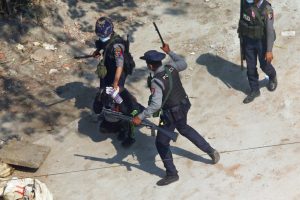More than 760 soldiers and police in Myanmar have expressed an intention to join the growing opposition to military rule since the opposition’s call last month for a nationwide uprising and mass defections from the ranks.
On September 7, Duwa Lashi La, the acting president of the National Unity Government (NUG) called for a “people’s defensive war” to oust the “military terrorists” that overthrew the elected civilian government in February. He also urged police and soldiers to abandon the junta and join the People’s Defense Force (PDF), the NUG’s military wing.
In a statement on Friday, the NUG’s Ministry of Defense said that in the month after the September 7 call, 429 soldiers and 334 police contacted People’s Embrace, a group formed by defectors that aids anyone wishing to make the difficult leap out of the ranks.
Although the ministry did not reveal how many of these personnel had actually defected, the announcement comes amid frequent reports of soldiers defecting or striking, especially in areas where the military has faced the strongest resistance from civilian militia groups. For instance, The Irrawaddy reported on September 23 that 350 police and 21 soldiers had gone on strike in Chin State since the coup. Earlier in the month, the NUG claimed that nearly 2,500 soldiers and police had broken with the military junta since the coup on February 1.
The announcement also comes as the anti-coup resistance shifts into a new and more intense phase of armed struggle. Earlier this month the NUG’s Ministry of Home Affairs and Immigration reported that 1,562 soldiers had been killed and 552 wounded in 132 attacks by ethnic armed groups and civilian resistance fighters since the call for a national uprising on September 7.
Despite this progress, there remain many obstacles to large-scale defections from the ranks. As Andrew Selth noted in a recent monograph 0n the Tatmadaw’s structure and worldview, service members are fed a catechism of extreme patriotism based on “specters of internal division and external threat,” which claims the military is the only thing that has prevented the nation from falling apart. This ideological bond is reinforced by the personal connections and loyalties that are interwoven with the formal chain of command.
A military career also confers considerable material advantages, even to foot soldiers. The families of serving personnel often live on Tatmadaw bases or in dedicated accommodation. They also “have access to resources often denied to civilians, particularly during shortages and times of internal unrest, when municipal services fail and the basic necessities of life become scarce.” Added to the danger of being shot or detained for deserting the ranks, all of these make defection a hugely perilous choice.
However, in the context of the intensifying armed resistance to the military administration, and the increasing privations faced by the Myanmar population, the NUG is banking on the fact that more service members will be open to chose this route. As Nyi Thuta, a former army captain of the People’s Soldier group, another group that helps military personnel to defect, told The Irrawaddy, large numbers of soldiers would defect in the face of determined resistance.
As with the NUG casualty figures, its claims about defecting soldiers are hard if not impossible, to verify. Even if accurate, it is also hard to know exactly what impact they will have on the military. But as Myanmar’s post-coup crisis grows, and the resistance to the coup government continues to spread, it is becoming abundantly clear that the Tatmadaw now faces perhaps its greatest ever challenge.

































